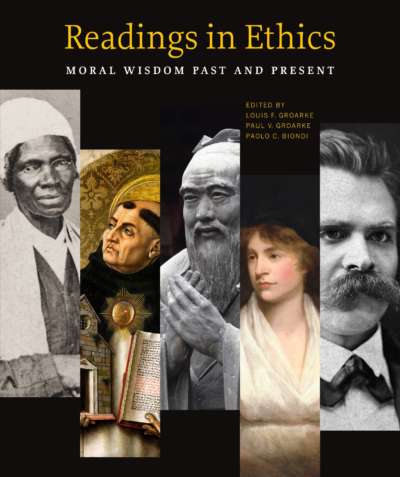A modified ebook containing many of the historical readings contained in The Broadview Anthology of Social and Political Thought is available here.
This volume features a careful selection of major works in political and social philosophy from ancient times through to the present. Every reading has been painstakingly annotated, and each figure is given a substantial introduction highlighting his or her major contribution to the tradition. The anthology offers both depth and breadth in its selection of material by central figures, while also representing other currents of political thought. Thirty-two authors are represented, including fourteen from the 20th century. The editors have made every effort to include translations that are both readable and reliable.
In order to ensure the highest standards of accuracy and accessibility, the editors have consulted dozens of leading academics during the course of the volume’s development (many of whom have contributed introductory material as well as advice). The result is an anthology with unparalleled pedagogical benefits; The Broadview Anthology of Social and Political Thought sets the new standard for social and political philosophy instruction.
The Broadview Anthology of Social and Political Thought is also available in split volumes for courses that are divided chronologically:
The Broadview Anthology of Social and Political Thought: Volume 1: From Plato to Nietzsche
The Broadview Anthology of Social and Political Thought: From Machiavelli to Nietzsche
The Broadview Anthology of Social and Political Thought: Volume 2: The Twentieth Century and Beyond
Comments
“This is a wonderful collection, with great introductory essays. … We should all be grateful to the editors for selecting and contextualizing so rich a body of materials.” — Kwame Anthony Appiah, New York University
“The selections are broader than in other works I have seen. … The annotation is, as advertised, fuller than is usual in such works, and consistently helpful. … All in all, this is an impressive work—by far the best political anthology I have seen.” — George Klosko, Henry L. and Grace Doherty Professor, University of Virginia
“Quite simply, this is a fantastic anthology. It includes not just the standard readings from the western canon but also important ones left out of most anthologies, including several by women. The anthology includes concise, accurate, and extremely helpful introductions, which include, uniquely, a discussion of ‘common misperceptions’ of each work. These introductions are perfectly pitched for an undergraduate audience.” — Darren Walhof, Grand Valley State University
Preface
Acknowledgements
Thucydides
- History of the Peloponnesian War, 2.40: Pericles’ Funeral Oration
Plato
- Apology
- Crito
- The Republic
- Book 1
Book 2
from Book 3
from Book 4
from Book 5
from Book 7
Book 8
from Book 9
Aristotle
- Nicomachean Ethics
- Politics
- Book 1
Book 2
Book 3
Book 4
from Book 5
from Book 7
Niccolò Machiavelli
- The Prince (written 1513, published 1532)
- Dedication
Chapter 5: Concerning the way to govern cities or principalities which lived under their own laws before they were annexed
Chapter 6: Concerning new principalities which are acquired through one’s own arms and ability
Chapter 7: Concerning new principalities which are acquired either through the arms of others or by good fortune
Chapter 8: Concerning those who have obtained a principality through wickedness
Chapter 9: Concerning a civil principality
Chapter 10: Concerning the way in which the strength of all principalities ought to be measured
Chapter 11: Concerning ecclesiastical principalities
Chapter 12: Of the different types of troops and mercenaries
Chapter 13: Concerning auxiliary, mixed, and citizen soldiers
Chapter 15: Concerning things for which men, and especially princes, are praised or blamed
Chapter 16: Concerning generosity and miserliness
Chapter 17: Concerning cruelty and mercy, and whether it is better to be loved than feared
Chapter 18: Concerning the way in which princes should keep their word
Chapter 19: That one should avoid being despised and hated
Chapter 21: How a prince should act in order to gain esteem
Chapter 22: Concerning princes’ advisors
Chapter 23: How to avoid flatterers
Chapter 24: Why the princes of Italy have lost their states
Chapter 25: Of fortune’s power in human affairs, and how to deal with her
Chapter 26: An exhortation to liberate Italy from the barbarians
- Discourses on the First Ten Books of Titus Livius (1512-17)
- Niccolò Machiavelli to Zanobi Buondelmonte and Cosima Rucellai
- from First Book
- Introduction
Chapter 1: Of the Beginning of Cities in General, and Especially that of the City
of Rome
Chapter 2: Of the Different Kinds of Republics, and of What Kind the Roman Republic Was
- from Second Book
- Introduction
Chapter 2: What Nations the Romans Had to Contend against and with What Obstinacy They Defended Their Liberty
Chapter 20: Of the Dangers to Which Princes and Republic Are Exposed that Employ
Auxiliary or Mercenary Troops
Chapter 29: Fortune Blinds the Minds of Men When She Does Not Wish Them to
Oppose Her Designs
- from Third Book
- Chapter 9: Whoever Desires Constant Success Must Change His Conduct with the Times
Thomas Hobbes
- Leviathan (1660)
- The Introduction
- Part 1: Of Man
- Chapter 10: Of Power, Worth, Dignity, Honor, and Worthiness
Chapter 11: Of the Difference of Manners
Chapter 13: Of the Natural Condition of Mankind as Concerning Their Felicity and Misery
Chapter 14: Of the First and Second Natural Laws, and of Contracts
Chapter 15: Of Other Laws of Nature
Chapter 16: Of Persons, Authors, and Things Personated
-
Part 2: Of Commonwealth
-
Chapter 17: Of the Causes, Generation, and Definition of a Commonwealth
Chapter 18: Of the Rights of Sovereigns by Institution
Chapter 19: Of the Several Kinds of Commonwealth by Institution and of Succession
to the Sovereign Power
Chapter 20: Of Dominion Paternal and Despotical
Chapter 21: Of the Liberty of Subjects
Chapter 26: Of Civil Laws
Chapter 29: Of Those Things that Weaken or Tend to the Dissolution of a
Commonwealth
Chapter 30: Of the Office of the Sovereign Representative
John Locke
- Preface to the Two Treatises of Government
- The Second Treatise of Civil Government (1690)
- from A Letter Concerning Toleration (1689)
David Hume
- Of the Original Contract (1748)
Jean-Jacques Rousseau
- Discourse on the Origin and Foundations of Inequality among Men (1755)
-
Preface
Discourse on the Origin and Foundations of Inequality among Men
Appendix 1: Note [On Good and Evil in Human Life]
Appendix 2: Note [On Human Variety]
Appendix 3: Note [On the Views of John Locke]
Appendix 4: Note [On Humans Living in an Intermediate Stage]
-
On the Social Contract or Principles of Political Right (1762)
- Foreword
Book 1
Book 2
Book 3
Book 4
Immanuel Kant
- To Perpetual Peace: A Philosophical Sketch (1795)
- “To Perpetual Peace”
First Section: Which Contains the Preliminary Articles for Perpetual Peace among Nations
Second Section: Which Contains the Definitive Articles for Perpetual Peace among Nations
Appendix
Thomas Jefferson
- The Declaration of Independence [as amended and adopted in Congress], July 4, 1776
Alexander Hamilton and James Madison
- The Federalist No. 9
- The Federalist No. 10
- The Federalist No. 51
- The Federalist No. 78
Mary Wollstonecraft
- A Vindication of the Rights of Woman: With Strictures on Political and Moral Subjects (1792)
- Advertisement
Introduction
Part 1
- from Chapter 1: The Rights and Involved Duties of Mankind Considered
from Chapter 2: The Prevailing Opinion of a Sexual Character Discussed
from Chapter 3: The Same Subject Continued
from Chapter 4: Observations on the State of Degradation to Which Woman Is Reduced
by Various Causes
from Chapter 5: Animadversions on Some of the Writers Who Have Rendered Women Objects of Pity, Bordering on Contempt
from Chapter 6: The Effect Which an Early Association of Ideas Has Upon the Character
from Chapter 9: Of the Pernicious Effects Which Arise from the Unnatural Distinctions Established in Society
from Chapter 12: On National Education
from Chapter 13: Some Instances of the Folly Which the Ignorance of Women Generates; with Concluding Reflections on the Moral Improvement that a Revolution in Female Manners Might Naturally Be Expected to Produce
Edmund Burke
- from Reflections on the Revolution in France (1790)
- from On “Geographical Morality”
Alexis de Tocqueville
- Democracy in America, Book Two, Section 2 (1840)
-
Chapter 5: On the Use that Americans Make of Public Associations in Civil Life
Chapter 6: Of the Relation between Associations and Newspapers
Chapter 7: The Relationship between Civil and Political Associations
Chapter 8: How Americans Combat Individualism with the Principle of Self-Interest Rightly Understood
Sojourner Truth
- Speech Delivered at the Akron, Ohio Convention on Women’s Rights, 1851
- As Reported by the Anti-Slavery Bugle, 21 June 1851
As Reported by F.D. Gage for the National Anti-Slavery Standard, 2 May 1863
John Stuart Mill
- On Liberty (1859)
- from Chapter 1: Introductory
from Chapter 2: Of the Liberty of Thought and Discussion
from Chapter 3: On Individuality, as One of the Elements of Well-Being
from Chapter 4: Of the Limits of the Authority of Society over the Individual
from Chapter 5: Applications
-
Considerations on Representative Government (1861)
- from Chapter 10: Of the Mode of Voting
Chapter 16: Of Nationality, as Connected with Representative Government
- Utilitarianism (1863)
- from Chapter 2: What Utilitarianism Is
from Chapter 3: Of the Ultimate Sanction of the Principle of Utility
from Chapter 5: On the Connection between Justice and Utility
- from The Subjection of Women (1869)
Karl Marx and Friedrich Engels
Friedrich Nietzsche
- On the Genealogy of Morals (1887)
- from First Essay: Good and Evil, Good and Bad
from Second Essay: Guilt, Bad Conscience and Related Matters
V.I. Lenin
- from What Is to Be Done? (1902)
W.E.B. Du Bois
- from The Souls of Black Folk (1903)
- Chapter 1: Of Our Spiritual Strivings
Simone de Beauvoir
- from The Second Sex (1949)
Isaiah Berlin
- “Two Concepts of Liberty” (1958)
Frantz Fanon
- from The Wretched of the Earth (1961)
Jürgen Habermas
- A summary of the 1962 work The Structural Transformation of the Public Sphere, “The Public Sphere” (1973)
- from The Inclusion of the Other: Studies in Political Theory, “Three Normative Models of Democracy” (1996)
Martin Luther King, Jr.
- “Letter from Birmingham Jail” (April 16, 1963)
John Rawls
- from A Theory of Justice (originally published 1971, revised edition 1999)
- 3. The Main Idea of the Theory of Justice
4. The Original Position and Justification
5. Classical Utilitarianism
6. Some Related Contrasts
11. Two Principles of Justice
13. Democratic Equality and the Difference Principle
14. Fair Equality of Opportunity and Pure Procedural Justice
15. Primary Social Goods as the Basis of Expectations
17. The Tendency to Equality
24. The Veil of Ignorance
- “The Idea of an Overlapping Consensus” (1987)
Robert Nozick
- from Anarchy, State, and Utopia (1974)
- from Chapter 7: Distributive Justice
Michel Foucault
- from Discipline and Punish (1975)
Michael J. Sandel
- “The Procedural Republic and the Unencumbered Self ” (1984)
Susan Moller Okin
- from Justice, Gender, and the Family (1989)
- Chapter 5: Justice as Fairness: For Whom?
Chapter 8: Conclusion: Toward a Humanist Justice
Iris Young
- from Justice and the Politics of Difference (1990)
- Chapter 1: Displacing the Distributive Paradigm
Will Kymlicka
- from Multicultural Citizenship (1995)
- Chapter 6: Justice and Minority Rights
Permissions Acknowledgments
Index of Authors and Titles
General Editors:
Andrew Bailey, University of Guelph
Samantha Brennan, University of Western Ontario
Will Kymlicka, Queen’s University
Jacob Levy, McGill University
Alex Sager, Portland State University
Clark Wolf, Iowa State University













